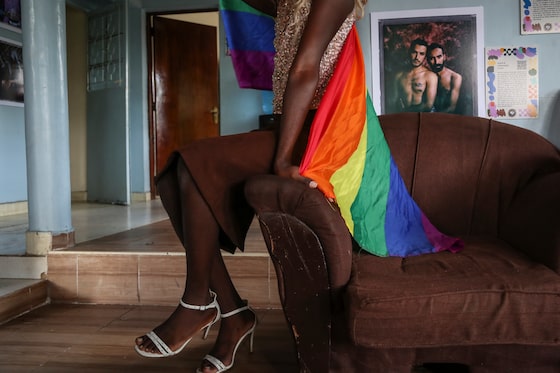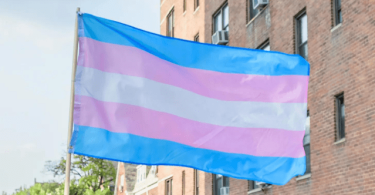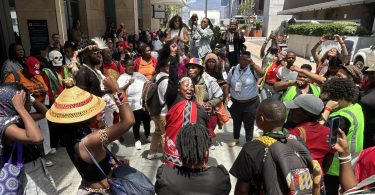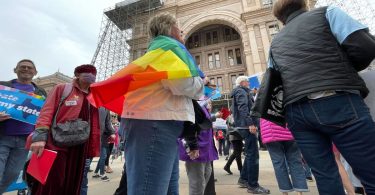Ugandan transgender woman Pretty Peter, who fled her home and country in 2019, poses for a photograph in front of a portrait from a global project called ‘Where Love is Illegal,’ at the safe house where she now lives in Nairobi, on June 1, 2023.Brian Inganga/The Associated Press
The plain clothes security agents arrived at Nina’s office with her mother. They handcuffed her and drove her to a mental-health hospital, where she was sedated and held under close guard for a terrifying two-month ordeal.
Nina, a 25-year-old Ugandan software developer and transgender woman, glimpsed her hospital file one day. “Gender reorientation,” it read.
The hospital staff forced her into Bible study classes, trying to shame her into abandoning her identity. They threatened to cut her hair. They warned her that they would put her into the “cold box” – an old meat freezer – if she misbehaved. She thought constantly of escape, but was too tightly guarded.
“I was in so much fear,” she said. “I broke down. I almost committed suicide.”
Nina’s experience, in a hospital in Kampala in 2022, is becoming increasingly common across Africa. Sessions referred to as counselling or rehabilitation, often mandatory, are being imposed on LGBTQ people in a growing number of countries. (The Globe and Mail is withholding Nina’s full name because of the dangers she faces in Uganda.)
As governments approve new laws to criminalize and imprison LGBTQ people, their policies often include conversion therapy – treatments aimed at changing a person’s sexual orientation or gender identity.
United Nations experts have described conversion-therapy treatments as cruel, degrading, inhuman and potentially amounting to torture. But this hasn’t stopped some African governments from portraying it as the solution.
Uganda’s latest anti-gay law, approved by its government last year, imposes harsh new prison sentences for some acts and even allows the death penalty for the vaguely defined act of “aggravated homosexuality.” It also authorizes the courts to require convicted people to receive what they call social services for the purpose of rehabilitating them. This is widely understood to be a reference to conversion therapy.
Those who undergo such services can then be permitted to work in jobs, such as child care, that would otherwise be barred to them, the law says.
Just a few weeks before signing the law, Ugandan President Yoweri Museveni met delegates from a conference in Uganda. One of the conference organizers was the U.S. evangelical Christian organization Family Watch International, which promotes conversion therapy as a solution for “unwanted sexual behaviour.”
Frank Mugisha, a prominent Ugandan LGBTQ activist, is worried that the use of conversion therapy will escalate under the new anti-gay law. He said there is a rising trend of “serenity centres” – rehabilitation centres for drug and alcohol addiction – doubling as conversion centres where families pay to send their LGBTQ relatives.
“I think those are dangerous,” he told The Globe and Mail. “Some of our friends just disappear, and then we can’t find them for a very long time. And when they show up three months later, they tell us all these stories, how their families picked them up and took them to some rehabilitation centre and they were locked up there for some time.”
Ugandan LGBTQ activist Steven Kabuye receives treatment at a hospital after he was attacked by unknown people, in Kitende on the outskirts of Kampala, Uganda, on Jan. 4.Hajarah Nalwadda/The Associated Press
Ghana’s parliament last month approved a tough new anti-gay bill, including jail terms of up to three years for anyone identifying as gay and five-year sentences for the promotion or support of LGBTQ activities. The bill becomes legal if it is signed by the president.
Anti-gay activists in Ghana have told media outlets they have taken hundreds of LGBTQ people to camps for conversion. A senior Ghanaian MP, majority leader Alexander Afenyo-Markin, has publicly called for conversion therapy for LGBTQ people. They should be ordered to undergo “counselling,” he said in the parliamentary debate.
“As a society we should focus on how to reform the people and help them to reintegrate,” he told a Ghanaian television interviewer.
A study in 2022 by Outright International, a rights group, found that 44 per cent of LGBTQ people in Kenya, South Africa and Nigeria had experienced conversion practices, and 36 per cent knew someone who had undergone them. The main perpetrators of this treatment in Africa were religious leaders, mental-health practitioners and family members, it found.
The effects of conversion therapy can haunt people for years. In Uganda, Nina resisted the conversion therapy and survived her treatment. But it has had lasting effects on her. She still can feel panicked in enclosed spaces. The relentless shaming and religious conditioning she experienced in hospital still traumatizes her today. “The memory just comes in and then it just starts, your hands start shivering,” she said.
Mr. Mugisha, the Ugandan activist, said the conversion pressure is often done in secret. “When I started coming out to my family, I was subjected to a lot of conversion therapy – medical, traditional and prayer,” he said. “And I was very unsuspecting because I trusted my family.”
As a teenager, he was subjected to aversion therapy, in which doctors used graphic images to convince him that same-sex relationships would lead to diseases or worse. “It was so disgusting for me to see as a child, but also it was so threatening,” he said. “I grew up so scared of sexual acts.”
Pierre Waldemar Brouard, a clinical psychologist and the acting director of the Centre for Sexualities, AIDS and Gender at the University of Pretoria in South Africa, was among mental-health experts from across Africa who, in April, 2023, signed a declaration against conversion practices on the continent.
Conversion therapy, he said, is often presented as a form of generosity, offering assistance to those who would otherwise be in jail. “I think the standpoint of ethical medical-health professionals would be that, in fact, it is a form of punishment.”
Steven Kabuye, a Ugandan LGBTQ activist, said his family tried to convert him when he was 15, around the time when an earlier anti-gay law was passed by Uganda’s parliament in 2014.
“They got me from Kampala, took me to my grandmother’s in Nakaseke, signed me up with the church to start doing catechism,” he said.
“I had to always visit the church, every day when I got back from school in the evening, until I felt like this is not me. And I had to rebel myself out of the village back to Kampala.”
After that, his family refused to pay for his education, calling him satanic. Later he worked with other activists and lawyers to challenge Uganda’s latest anti-gay law in court.
Last year he fled the country because of death threats and an attack on a colleague. He returned in mid-December. Less than three weeks later, he was stabbed repeatedly by two attackers on a motorcycle.
He was taken to hospital in critical condition, but survived and later went into exile again. “I have a lot of pain,” he told The Globe. “The trauma is still high. I rarely sleep at night and get nightmares.”
Ugandan LGBTQ people who could manage to leave the country have done so, he said. Those who cannot leave “have gone back to the closet, have gone back to the dark spheres of the country,” he said.
With a report from Geoffrey York in Johannesburg, South Africa







